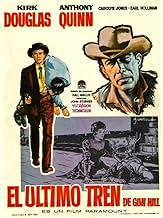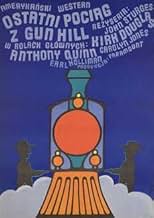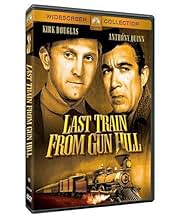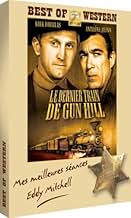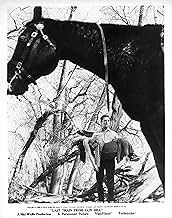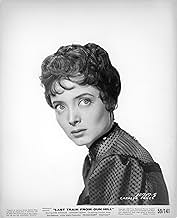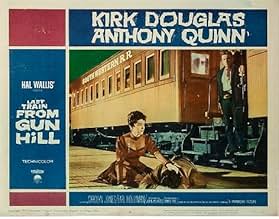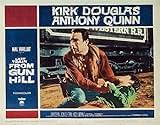एक मार्शल एक पुराने दोस्त के बेटे, एक निरंकुश मवेशी नवाब को लाने की कोशिश करता है, जो मार्शल की मूल अमेरिकी पत्नी के बलात्कार और हत्या के मामले में उसकी भूमिका के लिए न्याय प्रदान करता है.एक मार्शल एक पुराने दोस्त के बेटे, एक निरंकुश मवेशी नवाब को लाने की कोशिश करता है, जो मार्शल की मूल अमेरिकी पत्नी के बलात्कार और हत्या के मामले में उसकी भूमिका के लिए न्याय प्रदान करता है.एक मार्शल एक पुराने दोस्त के बेटे, एक निरंकुश मवेशी नवाब को लाने की कोशिश करता है, जो मार्शल की मूल अमेरिकी पत्नी के बलात्कार और हत्या के मामले में उसकी भूमिका के लिए न्याय प्रदान करता है.
- पुरस्कार
- कुल 1 नामांकन
- Lee Smithers
- (as Brian Hutton)
- Craig's Man
- (बिना क्रेडिट के)
- Salesman in Horseshoe
- (बिना क्रेडिट के)
- Townsman
- (बिना क्रेडिट के)
- Townsmen
- (बिना क्रेडिट के)
- Cowboy
- (बिना क्रेडिट के)
- Barfly
- (बिना क्रेडिट के)
- Small Man in Horseshoe
- (बिना क्रेडिट के)
- Townsman
- (बिना क्रेडिट के)
कहानी
क्या आपको पता है
- ट्रिवियाDuring the final shootout, Morgan was supposed to beat Smithers to the draw. However, the actor playing Smithers, Brian G. Hutton kept beating Douglas to the draw. Finally it was decided that Kirk Douglas should be holding a shotgun thereby ending that argument. Afterwards Douglas remarked "Can you imagine that upstart beating me to the draw?" Anthony Quinn said, "Don't worry about it, Kirk. We'll get him in the editing room."
- गूफ़On its way to Gun Hill, the train has four cars. By the time it reaches the station, there are only two, and the baggage car is a different one than before.
- भाव
Rick Belden, Craig's Son: Don't take no guts to kill a man when he's cuffed!
Marshal Matt Morgan: Takes guts not to. Be too easy on ya. You'd die too quick. I know an old man who'd like to kill you, Belden - the Indian way: slow. That's how I'm gonna do it: slow - but the white man's way. First you stand trial. That takes a fair amount of time, and you'll do a lot of sweating! Then they'll sentence ya. I never seen a man who didn't get sick to his stomach when he heard the kind of sentence you'll draw. After that you'll sit in a cell and wait, maybe for months, thinking how that rope will feel around your neck. Then they'll come around, some cold morning, just before sun-up. They'll tie your arms behind you. You'll start blubbering, kicking, yelling for help. But it won't do you any good. They'll drag you out in the yard, heave you up on that platform, fix that rope around your neck and leave you out there all alone with a big black hood over your eyes. You know the last sound you hear? Kind of a thump when they kick the trapdoor catch - and down you go. You'll hit the end of that rope like a sack of potatoes, all dead weight. It'll be white hot around your neck and your Adam's Apple will turn to mush. You'll fight for your breath, but you haven't got any breath. Your brain will begin to boil. You'll scream and holler! But nobody'll hear you. You'll hear it. But nobody else. Finally you're just swingin' there - all alone and dead.
- कनेक्शनFeatured in The Image Book (2018)
Craig Beldon (Anthony Quinn): `This is my son you're talking about.'
Matt Morgan (Kirk Douglas): `No, Craig. It's my wife we're talking about.'
Thankfully, the filmmakers did not choose to cheat the audience and followed through to the end.
This is an excellent and long underrated film that stands next to 3:10 to Yuma (which this film is very similar to, even sharing plots) and Shane as the best westerns of the 1950s. It is the darkest of all the physiological westerns of the time, and the startling opening to the film leaves these characters in this situation with no way out, no escape. There can be no happy ending to this film. Also, none of the other films of this type, the `noir' or `siege' westerns, included so many of the difficult realities of racism, class and political power, and domestic violence and how these realities complicate friendship, love, and society.
The characters of Morgan and Beldon are studies in contrast. Both rode together years before on the wrong side of the law, Beldon saving Morgan's life at one point. However, in their years apart they had developed very differently. Morgan has become a marshal in a small town, Pauly, whose wild past he helped to end. In his first scene he describes a gunfight that took place there eight years before to a group of boys. All the boys were born after the gunfight, after the town had settled down and become `civilized.' Morgan travels using the train or a buckboard, his outfit resembles a business suit and he even wears a (bola) tie. When his wife, a Cherokee woman, is raped and murdered, he swears to kill the culprits but here enters one of the complications in this film, one of the many that make it so interesting. Morgan is not simply a typical, heroic figure defending justice and order (like Cooper in High Noon), though he does represent these ideals. His use of the law is not simply an altruistic faith it's correctness but, in this case, is his chosen instrument of vengeance. He is going to Gunhill to capture the men responsible for his wife's death, men he will bring back to Pauly and, using the courts, the jury, and the scaffold, will kill them. In the movie's most chilling scene, Morgan describes to one of the handcuffed killers what it will be like when he is hung, enjoying the impact of his words on the man. While he gloats the viewer remembers that he is a good man, a father, marshall, a man you might know and would respect.
Beldon is a rancher who has `sewed up this entire country' and owns the town, `even the town council' and the sheriff. His values are masculine, he is always surrounded by men his son and his ranch hands and his wife is long dead. He thoroughly dominates his surroundings, his town. He can be incredibly generous to his few friends, incredibly demanding of his son, his lover, and his town. In Gunhill, he is the law, while Morgan only represents it.
Linda, Beldon's lover, returns to Gunhill on the same train that brings Morgan to town. She is returning from a hospital after Beldon had beat her:
Linda: `When he tells you dirty, lying stories about me, why do you believe him? Why don't you for once believe me?'
Beldon: `Because he's my son.'
She is only person in the town that will help Morgan, though her reasons are complex: sympathy, revenge against the son, an attempt to hurt the man she loves, the man that hurts her, that chooses to believe the lies of his son because they are his son's lies. Also, she is the only person in the town that will allow herself to feel the horror of the rape, murder, and siege. I find the attitudes and actions of the townspeople in this film more believable than that of those in High Noon. Here the town is unfeeling and hard, frightened about what would happen if they ever allowed themselves to empathize with the weak, rebel against Beldon. They mock Morgan with racist statements that denigrate his wife because it is easier for them to believe that she was "only an Indian", that her death really didn't matter, that her suffering was irrelevant.
The reason the film succeeds, in the end, is that it makes all of these flawed characters sympathetic and understandable. If they could avoid the conflict, they would. Unfortunately, the situation will not allow it.
The other characters are well drawn too, including the sheriff who insists on `taking the long view'; the viscous son Rick who the viewer cannot help but feel some sympathy for because he is so dominated by the father, swept along in his wake; and the reckless ranchhand Lee, who is loyal to the son and not the father.
The acting is great all around, particularly from Carolyn Jones, Quinn, and Douglas, the pairing of which was excellent. Both performances are intense and explosive, as is the film. Poe's script is excellent and Tiomkin provides a good score.
There have only been a few westerns since 1959 that have matched the complexity and substance of Last Train: Once Upon A Time In The West, The Great Silence, McCabe and Mrs. Miller, and Unforgiven. All of these films exploit the genre's tragic possibilities to the fullest and all are unforgettable. When I think of these films the eyes of Trintignant in the final scene of The Great Silence come to mind, or the way, in this film, that Douglas yells the name of his wife or Quinn, at the train station, yells that of his son. It is amazing that in the most popular and industrial of art forms, in the most basic of all genres, could be created films of such beauty and power.
टॉप पसंद
विवरण
- रिलीज़ की तारीख़
- कंट्री ऑफ़ ओरिजिन
- भाषा
- इस रूप में भी जाना जाता है
- Last Train from Harper's Junction
- फ़िल्माने की जगहें
- उत्पादन कंपनियां
- IMDbPro पर और कंपनी क्रेडिट देखें
बॉक्स ऑफ़िस
- US और कनाडा में सकल
- $25,00,000
- चलने की अवधि1 घंटा 35 मिनट
- रंग
- पक्ष अनुपात
- 1.85 : 1
इस पेज में योगदान दें



